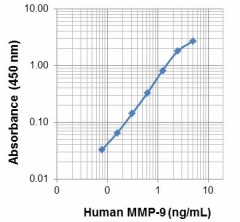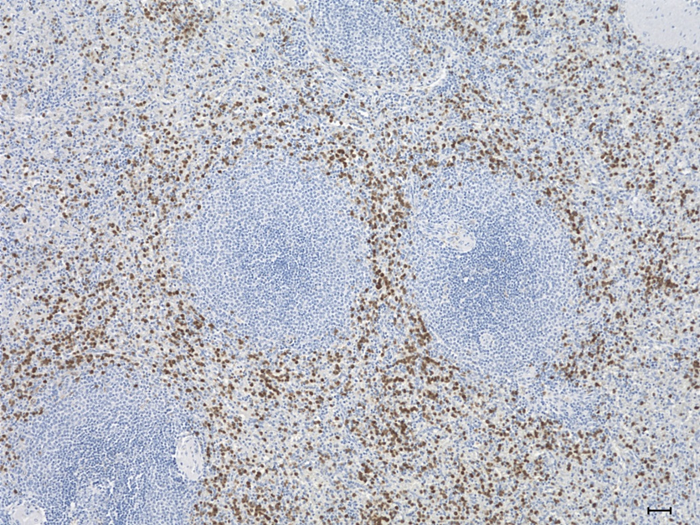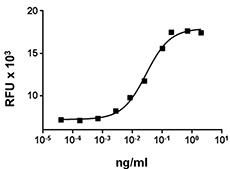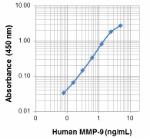- Clone
- M2101G05 (See other available formats)
- Regulatory Status
- RUO
- Other Names
- Gelatinase B, Type IV collagenase, 92 kD gelatinase, Type V collagenase, GELB, CLG4B, MMP-9, MANDP2
- Isotype
- Mouse IgG2a, κ
- Ave. Rating
- Submit a Review
- Product Citations
- publications

| Cat # | Size | Price | Quantity Check Availability | Save | ||
|---|---|---|---|---|---|---|
| 681802 | 100 µg | 184€ | ||||
MMP9, or MMP-9, is a member of the matrix metalloprotease family of proteins (MMPs). Members of this family are structurally related, zinc-containing enzymes that degrade the extracellular matrix (ECM) and connective tissue proteins. Proteolytic activities of MMPs play an important role in vascular remodeling, cellular migration, and the processing of ECM proteins and adhesion molecules. MMP9 consists of a prodomain, catalytic domain, hinge region, and a hemopexin domain. It is secreted as an inactive zymogen that becomes activated extracellularly. The most relevant natural activators of proMMP9 are unknown. MMP9 activation may be mediated by removal of the prodomain by serine proteases or other MMPs, or it may be a direct response to oxidative stress that disrupts the cysteine switch. MMP9 is capable of processing cytokines and chemokines. For example, it is reported to release the biologically active form of vascular endothelial growth factor (VEGF), which indicates that MMP9 may play a crucial role in the formation of new blood vessels. Increased MMP9 expression and activity has been shown to be related to various cancers, as it may contribute to the release of metastatic cells from the bulk tumor as well as their entrance at the site of metastasis by degrading proteins in the ECM and basement membrane.
Product DetailsProduct Details
- Verified Reactivity
- Human
- Antibody Type
- Monoclonal
- Host Species
- Mouse
- Immunogen
- Human MMP-9, amino acids (Ala20-Asp707) (Accession# NP_004985.2), is expressed with a C-terminal 8His tag and a linker sequence in the 293E cell line.
- Formulation
- Phosphate-buffered solution, pH 7.2, containing 0.09% sodium azide.
- Preparation
- The antibody was purified by affinity chromatography.
- Concentration
- 0.5 mg/ml
- Storage & Handling
- The antibody solution should be stored undiluted between 2°C and 8°C.
- Application
-
ELISA Capture - Quality tested
- Recommended Usage
-
Each lot of this antibody is quality control tested by ELISA assay. For ELISA Capture applications, a concentration of 4.0 µg/mL is recommended. To obtain a linear standard curve, serial dilutions of MMP-9 recombinant protein ranging from 5 to 0.078 ng/mL is recommended for each ELISA plate. It is recommended that the reagent be titrated for optimal performance for each application.
- Application Notes
-
This antibody is only tested on recombinant proteins. It may not be able to detect endogenous proteins from cell or tissue lysates by western blotting (WB), where the expression levels may be too low.
The purified M2101G05 antibody is useful as the capture antibody in a sandwich ELISA assay, when used in conjunction with the biotinylated M2108F07 antibody (Cat. No. 532101) as the detecting antibody.
Note: For testing human MMP-9 in serum or plasma, BioLegend's LEGEND MAX™ Kit (Cat. No. 444907) is specially developed and recommended. - RRID
-
AB_2566497 (BioLegend Cat. No. 681802)
Antigen Details
- Distribution
-
MMP9 is expressed by alveolar macrophages, granulocytes, fibroblasts, and fibrosarcoma cells.
- Function
- Degradation of extracellular matrix (ECM) and connective tissue proteins, angiogenesis, tissue remodeling, and cancer metastasis. Regulates chemokine activity. Inhibited by TIMPs and α2-macroglobulin (inhibitor of MMPs in bodily fluids).
- Interaction
- ECM proteins.
- Ligand/Receptor
- TIMPs.
- Cell Type
- Fibroblasts, Granulocytes, Macrophages
- Biology Area
- Angiogenesis, Cell Adhesion, Cell Biology, Neuroinflammation, Neuroscience
- Molecular Family
- Enzymes and Regulators
- Antigen References
-
1. Chakrabarti S, Patel KD. 2005. Exp. Lung Res. 31:599.
2. Klein T, Bischoff R. 2011. Amino Acids 41:271.
3. Raffetto JD, Khalil RA. 2008. Biochem. Pharmacol. 75:346.
4. Bourboulia D, Stetler-Stevenson WG. 2010. Semin. Cancer Biol. 20:161.
5. Vilen ST, et al. 2013. Scientific World Journal 920595. - Gene ID
- 4318 View all products for this Gene ID
- UniProt
- View information about MMP-9 on UniProt.org
Related Pages & Pathways
Pages
Related FAQs
Other Formats
View All MMP-9 Reagents Request Custom Conjugation| Description | Clone | Applications |
|---|---|---|
| Purified anti-MMP9 | M2101G05 | ELISA Capture |
Customers Also Purchased
Compare Data Across All Formats
This data display is provided for general comparisons between formats.
Your actual data may vary due to variations in samples, target cells, instruments and their settings, staining conditions, and other factors.
If you need assistance with selecting the best format contact our expert technical support team.
 Login / Register
Login / Register 













Follow Us